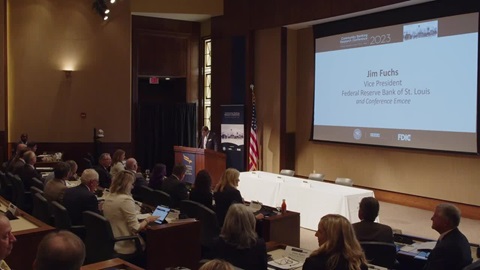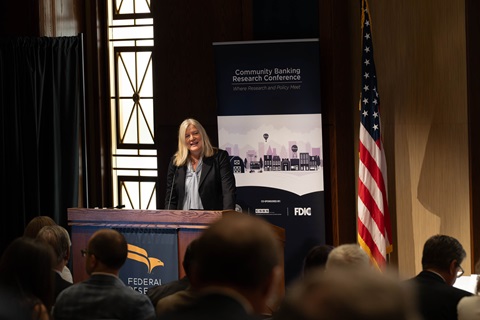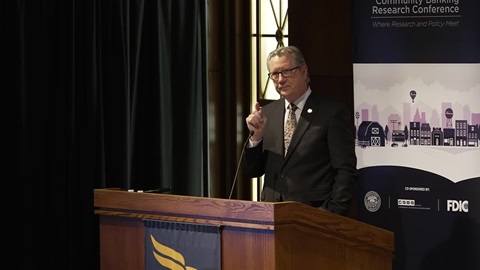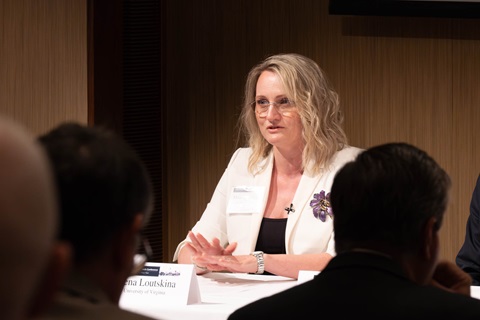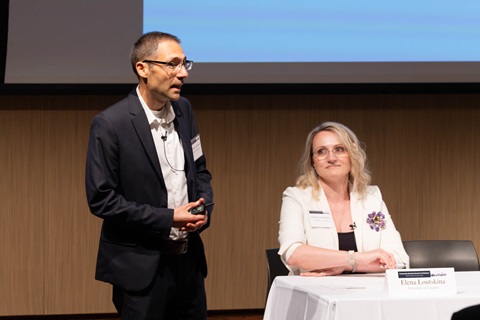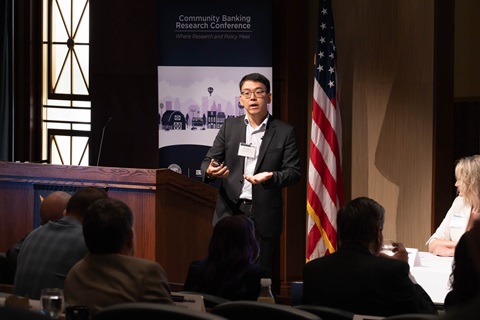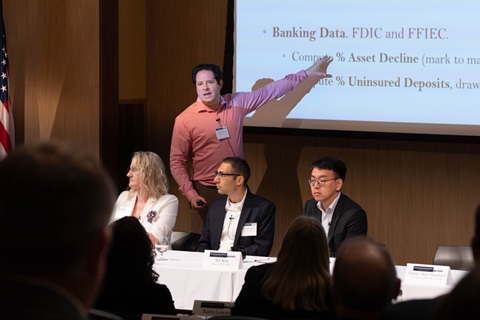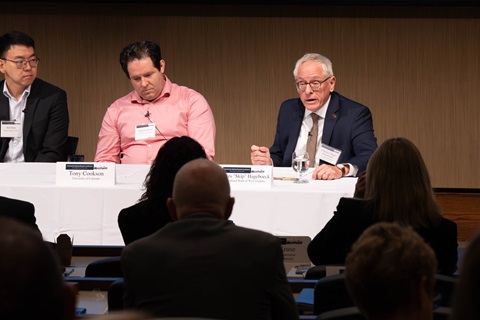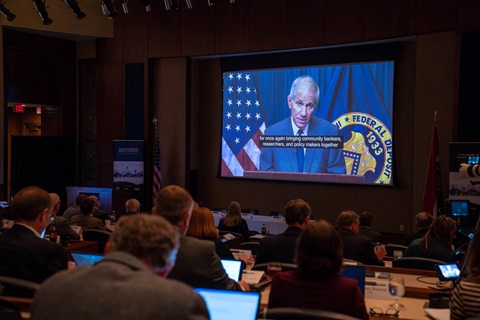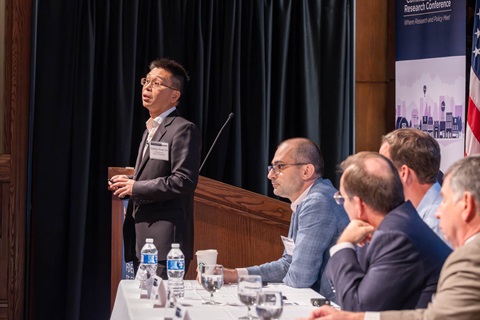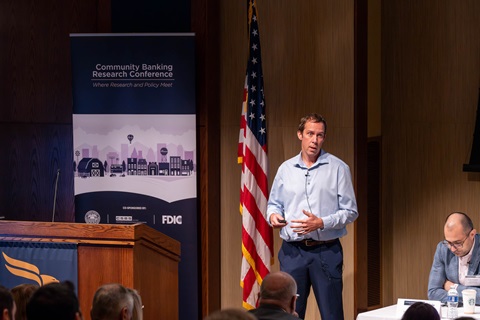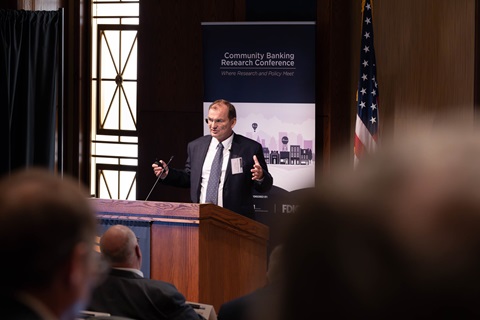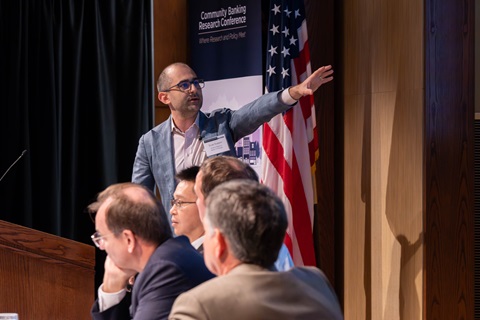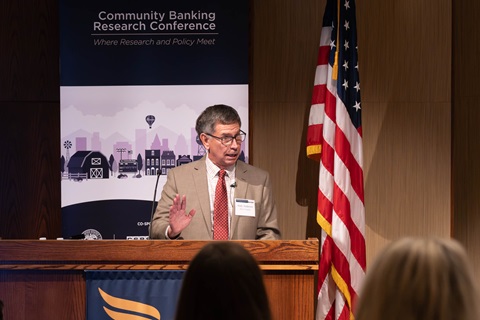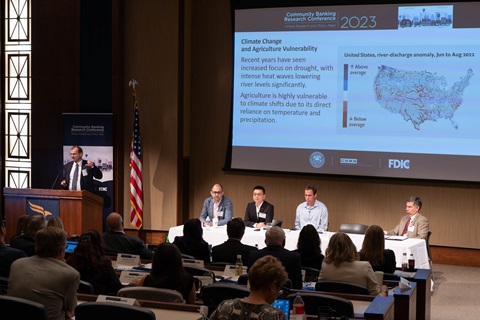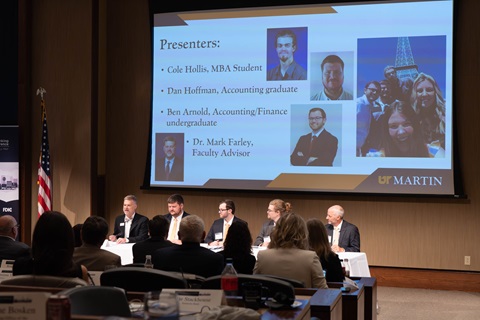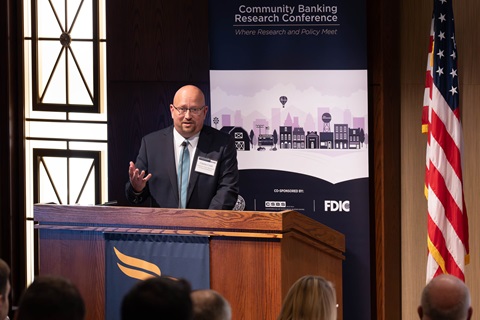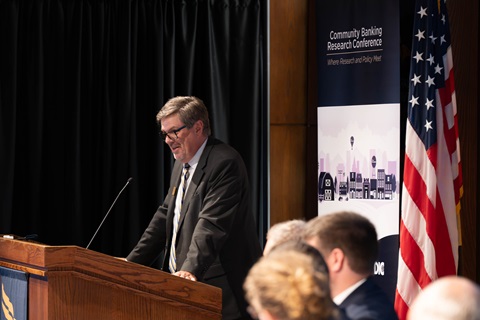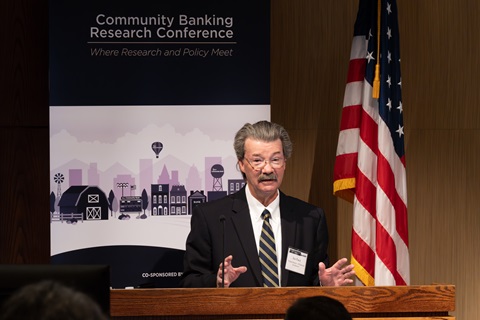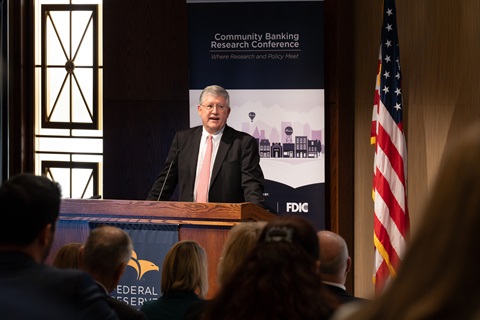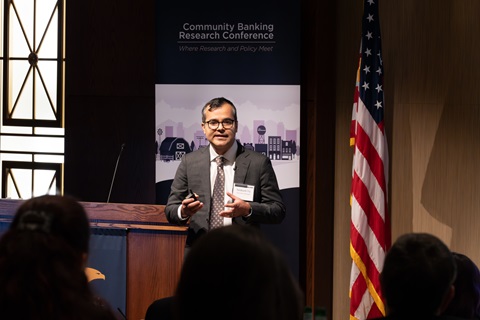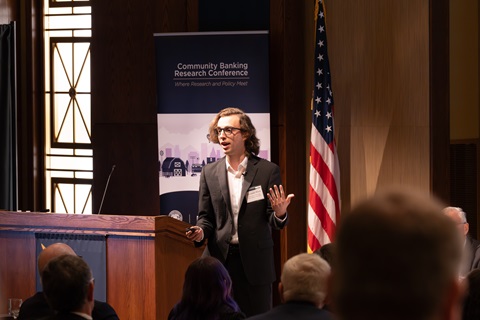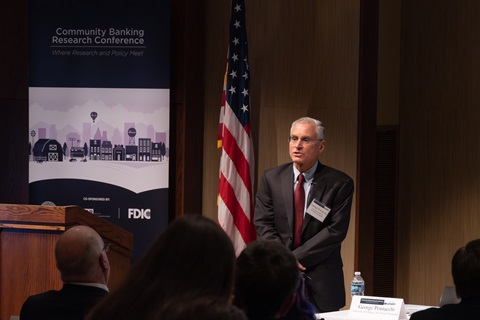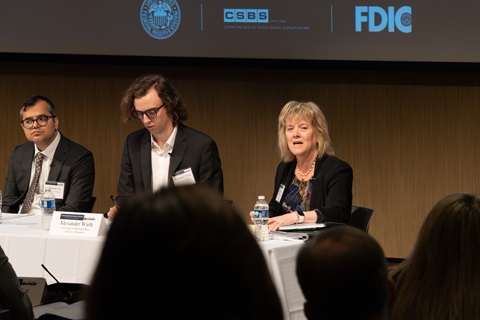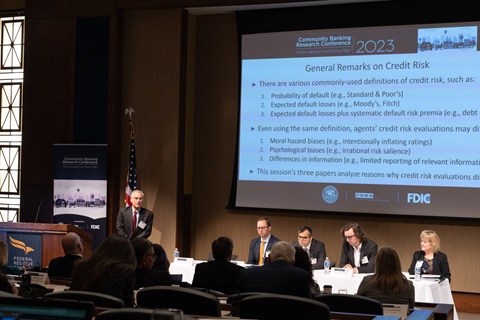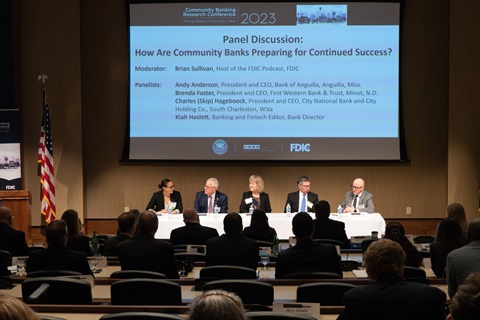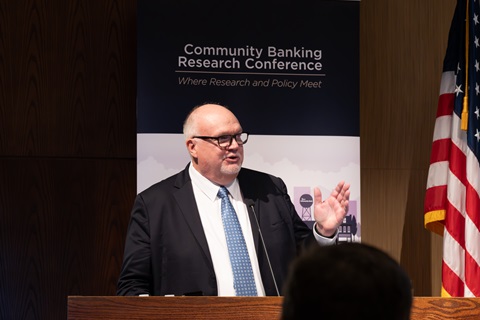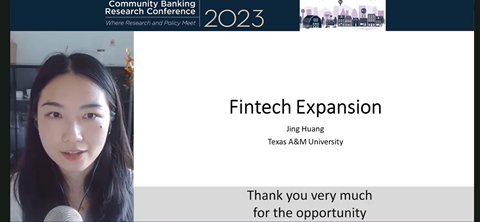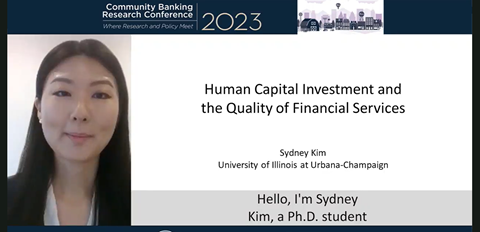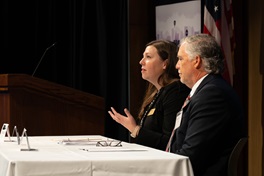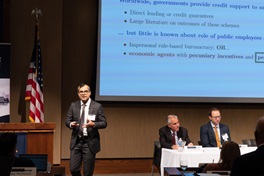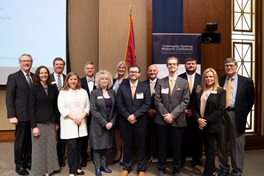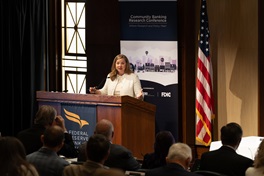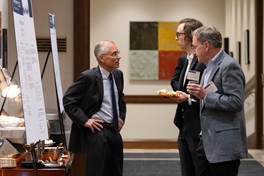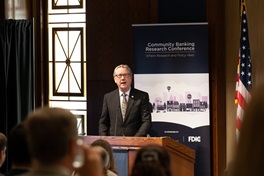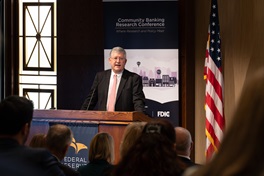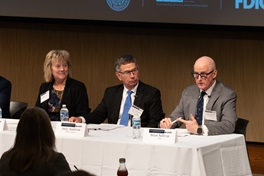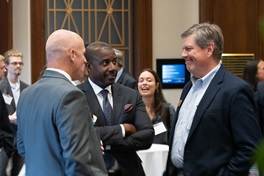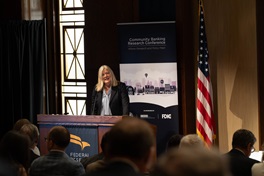
Community Banking Research Conference
The eleventh annual Community Banking Research Conference—sponsored by the Federal Reserve System, the Conference of State Bank Supervisors (CSBS) and the Federal Deposit Insurance Corp. (FDIC)—will be hosted as a hybrid event on Oct. 4 and Oct. 5. The conference brings together community bankers, academics, policymakers and bank regulators to discuss the latest research on community banking.
The conference presents an innovative approach to the study of community banks. Academics explore issues raised by the industry in a neutral, empirical manner and present their findings at the conference. Community bankers contribute to an annual survey prior to the conference and then participate directly in the conference by serving as keynote speakers and panelists, and by providing feedback to the research presented. For more information, please contact conference@communitybanking.org.
Conference Agenda
Gateway Auditorium, 6th Floor | Federal Reserve Bank of St. Louis
October 4-5, 2023
Download as PDF
- Wednesday, October 4
-
Introduction
-
Welcoming Remarks
-
Morning Keynote
-
Presentation of Findings from the 2023 CSBS Annual Survey of Community Banks
-
Break
-
Research Paper Session 1
Interest Rate Risk and Depositor Runs Moderator: Elena Loutskina
Moderator: Elena Loutskina
Professor of Business Administration, Peter M. Grant II Bicentennial Foundation Chair in Business Administration, Darden School of Business, University of Virginia
 Community Bank Discussant: Charles 'Skip' Hageboeck
Community Bank Discussant: Charles 'Skip' Hageboeck
President and CEO, City National Bank and City Holding Company, South Charleston, W. Va.
Dynamic Deposits: The Role of Inflows on Future OutflowsMichael Gelman, University of DelawareSocial Media as a Bank Run CatalystAnthony Cookson, University of Colorado at BoulderModerator Response -
Lunch
-
Afternoon Keynote
-
Research Paper Session 2
Banking Sector Resilience to Extreme Weather EventsExtreme Wildfires, Distant Air Pollution, and Household Financial HealthXudong (Sean) An, Federal Reserve Bank of PhiladelphiaNatural Disasters, Local Bank Market Share, and Economic RecoveryJustin Gallagher, Montana State UniversityAs Dry as a Bone: How do Banks Cope with Droughts?Oskar Kowalewski, IESEG School of ManagementModerator ResponseCommunity Bank Discussant ResponseQA Session -
Break
-
2023 CSBS Community Bank Case Study Competition Winning Presentation
 Introduction: Charles Clark
Introduction: Charles Clark
Director, Washington State Department of Financial Institutions; Chair, CSBS
Student Team- University of Tennessee at MartinBen Arnold, Cole Hollis, Dan Hoffman
Community Bank PartnerClint Davis, President and Chief Operating Officer, Commercial Bank & Trust, Paris, Tenn.
-
Day One Reflections
-
Dinner Reception
- Thursday, October 5
-
Breakfast and Networking
-
Community Banker Keynote
 Jeff Szyperski
Jeff Szyperski
President and CEO, Chesapeake Financial Shares, Inc. and Chesapeake Bank, Kilmarnock, Va.
-
Research Paper Session 3
Assessing Credit Risk Moderator: George Pennacchi
Moderator: George Pennacchi
Fred S. Bailey Memorial Chair of Finance, Gies College of Business, University of Illinois Urbana-Champaign
 Community Bank Discussant: Brenda Foster
Community Bank Discussant: Brenda Foster
President and CEO, First Western Bank and Trust, Minot, N.D.
Internal Loan Ratings, Supervision, and Procyclical LeverageStephen Karolyi, Office of the Comptroller of the Currency (OCC)Regulatory Risk Perception and Small Business LendingSiddharth Vij, University of GeorgiaCan Credit Rating Affect Credit Risk? Causal Evidence from an Online Lending MarketplaceAlexander Wirth, University of MichiganModerator ResponseCommunity Banker ResponseQA Session -
Break
-
Panel Discussion
Panelists Charles 'Skip' Hageboeck
Charles 'Skip' Hageboeck
President and CEO, City National Bank and City Holding Company, South Charleston, W. Va.
Panel Discussion -
Presentation of John Ryan Award and Concluding Remarks
-
Poster Papers
Human Capital Investment and the Quality of Financial ServicesSydney Kim, University of Illinois at Urbana Champaign
Research Papers, Authors and Key Findings
Research Paper Session 1
Interest Rate Risk and Depositor Runs
Dynamic Deposits: The Role of Inflows on Future Outflows
Authors: Michael Gelman, University of Delaware; Andrew McKinlay, Virginia Tech
Key Findings: Deposit inflows into the banking system are typically considered beneficial. The authors show, however, that deposit inflows can also lead to negative consequences. Banks that exhibit deposit inflows become riskier by increasing both interest rate risk and credit risk. In periods of monetary tightening, these banks face greater losses, and the more constrained ones experience uninsured deposit outflows. High deposit inflows can serve as an early indicator for understanding changes in bank risk and future deposit outflows (and even future runs on the bank). This information can assist depositors, bankers, stakeholders and policymakers.
Banks' Motivations for Designating Securities as Held to Maturity
Authors: Seil Kim, Baruch College; Sehwa Kim, Columbia University; Stephen Ryan, New York University
Key Findings: The authors provide evidence that banks classify securities as held to maturity (HTM) rather than available for sale when the HTM classification provides preferred financial accounting and regulatory capital treatments, and not because they have a distinct economically motivated intent and ability to hold the securities to maturity. The authors examine the treatment of securities by five banks in periods with and without the regulatory accumulated other comprehensive income (AOCI) filter and conclude that their findings provide support for recent calls to eliminate the HTM category and AOCI filter.
Social Media as a Bank Run Catalyst
Authors: Anthony Cookson, University of Colorado at Boulder; Corbin Fox, James Madison University; Javier Gil-Bazo, Universitat Pompeu Fabra; Juan Filipe Imbet, Université Paris Dauphine; Christoph Schiller, Arizona State
Key Findings: Social media no doubt played a role in the run on Silicon Valley Bank, and the effects were felt broadly in the U.S. banking system. The authors use comprehensive Twitter data to show that preexisting exposure to social media predicts bank stock market losses in the run period, even after controlling for bank characteristics related to run risk. Tweets authored by members of the tech startup community (who are likely depositors) and that contain keywords related to contagion produce even stronger effects. The authors’ results are consistent with depositors using Twitter to communicate in real time during a bank run.
Moderator Response
Research Paper Session 2
Banking Sector Resilience to Extreme Weather Events
Extreme Wildfires, Distant Air Pollution, and Household Financial Health
Authors: Xudong (Sean) An, Federal Reserve Bank of Philadelphia; Stuart Gabriel, UCLA; Nitzan Tzur-Ilan, Federal Reserve Bank of Dallas
Key Findings: The authors evaluate the impact of extreme U.S. wildfires and related smoke and air pollution events on household mobility, housing and financial outcomes. They focus on extreme wildfires over the 2016-2020 period and use the variation in fire, smoke and pollution incidence within and beyond treatment areas to assess event outcomes. They find significantly heightened credit distress among households that experienced the most destructive wildfires, as well as sizable house price declines and net outmigration from fire zones. More distant wildfire-related smoke and air pollution resulted in elevated credit card spending, indebtedness and delinquency.
Natural Disasters, Local Bank Market Share, and Economic Recovery
Authors: Justin Gallagher, Montana State University; Daniel Hartley, Federal Reserve Bank of Chicago
Key Findings: Economic theory suggests that community banks may have a greater incentive, but a lower capacity, to lend to a region following a destructive event such as a natural disaster. The authors test whether regions with more local banking at the time of a natural disaster have greater post-disaster lending, and, therefore, more rapid regional redevelopment characterized by higher employment and wages and greater population growth. They find a small reduction in lending in the years immediately following a large disaster. The reduction in new lending is driven by regions with more local banking at the time of a large disaster. These same regions exhibit lower wage, employment and population levels post-disaster as compared to regions with less local banking at the time of the disaster.
As Dry as a Bone: How do Banks Cope with Droughts?
Authors: Oskar Kowalewski, IESEG School of Management ; Michael Brei, University of Lille; Piotr Spiewanowski, Polish Academy of Sciences; Eric Strobl, University of Bern
Key Findings: The authors examine adaptation to climate change at U.S. banks over the period 2000-2019. They find that local banks reduce lending to small firms and the agriculture sector during drought periods, while increasing lending to households at the same time. They also find that local banks are more likely to increase liquidity during drought periods. Their results indicate that local banks react more strongly to drought than do large banks. They also show that the introduction of government financial assistance to drought-affected areas changed the lending and deposit behavior of banks and mitigated the negative consequences.
Moderator Response
Community Bank Discussant Response
QA Session
Research Paper Session 3
Assessing Credit Risk
Internal Loan Ratings, Supervision, and Procyclical Leverage
Authors: Stephen Karolyi, Office of the Comptroller of the Currency (OCC); Lewis Gaul, Office of the Comptroller of the Currency; Pinar Uysal, Board of Governors of the Federal Reserve System
Key Findings: The authors build a model of banks’ internal loan ratings and find evidence of systemic downward drift in ratings, consistent with initial ratings inflation. They also examine the causal impact of loan-level supervision on ratings and find not only that supervision reduces ratings inflation, but also that these effects spill over within a bank’s loan portfolio, consistent with a learning channel. They use their model to construct counterfactual capital ratios for banks based on a variety of scenarios, including an expansion of bank supervision. Their findings provide insight into the debate about the role of supervision in bank capital cyclicality.
Regulatory Risk Perception and Small Business Lending
Authors: Siddharth Vij, University of Georgia; Joseph Kalmenovitz, University of Rochester
Key Findings:
Using Small Business Administration (SBA) data, the authors examine how the perception of risk by regulators affects the ability of small businesses to obtain access to credit. They find that SBA loans and job creation are reduced at the new location when SBA employees transfer from offices with more current defaults on SBA loans. This effect is independent of local economic
conditions and the informational content of the nonlocal defaults. They conclude that misperception of economic conditions by regulators has a measurable effect on access to credit.
Can Credit Rating Affect Credit Risk? Causal Evidence from an Online Lending Marketplace
Authors: Alexander Wirth, University of Michigan; Amiyatosh Purnanandam, Ross School of Business, University of Michigan
Key Findings: The authors pose the following question: Although it is known that a credit rating is determined by a borrower’s credit risk, can the rating itself change a borrower’s credit risk in an economically meaningful manner? The data needed to answer this question are hard to obtain, but the authors take advantage of a March 2020 regulatory change that provides a credibly exogenous variation in the credit rating of borrowers with similar risk to show that individuals with a negative shock experienced an average decline of 16 points in their FICO scores, followed by a default rate that was 23 percentage points higher the next year. Their findings suggest that empirical studies linking credit ratings to real outcomes should carefully consider the endogenous effect of ratings on future outcomes.
Moderator Response
Community Banker Response
QA Session
Speakers and Panelists

Xudong (Sean) An is a vice president in the Supervision, Regulation, and Credit Department at the Federal Reserve Bank of Philadelphia. He oversees the Bank’s stress testing function and supervisory research function. An’s areas of research include retail credit, consumer finance, securitization, and risk management. His research papers have appeared in academic journals such as the Journal of Financial Economics and the Journal of Policy Analysis and Management. An is currently the First Vice President of the American Real Estate and Urban Economics Association (AREUEA) and serves on the editorial boards of Real Estate Economics and the Journal of Real Estate Finance and Economics. He has a Ph.D. from the University of Southern California and is an elected Fellow of the Weimer School of the Homer Hoyt Institute.
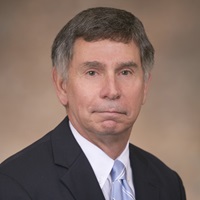 Andy Anderson is president and CEO of the Bank of Anguilla, Anguilla, Mississippi, where he also holds the role of chief financial officer and director. He has been with the bank for more than 40 years. He has served two terms as chairman of the Mississippi Bankers Association and serves on the American Bankers Association’s Community Bankers Council. He is also on the Board of Directors of the American Bankers Association. He sits on the Conference of State Bank Supervisors Banker’s Advisory Board and served several years as its chairman. He is a member of the Board of Directors of the Community Development Bankers Association in Washington, D.C. Anderson also serves as a mentor in the Graduate School of Banking of Colorado’s Executive Development Institute for Community Bankers. He is actively involved in two committees that are spearheading fund raising efforts for tornado relief in his hometown of Rolling Fork, Mississippi. He serves on the Rolling Fork Visitor Center and Museum Board and is a member of the local Rotary Club, among other state and local groups. He holds a bachelor’s degree and an MBA from the University of Mississippi and is a graduate of the Graduate School of Banking at Louisiana State University.
Andy Anderson is president and CEO of the Bank of Anguilla, Anguilla, Mississippi, where he also holds the role of chief financial officer and director. He has been with the bank for more than 40 years. He has served two terms as chairman of the Mississippi Bankers Association and serves on the American Bankers Association’s Community Bankers Council. He is also on the Board of Directors of the American Bankers Association. He sits on the Conference of State Bank Supervisors Banker’s Advisory Board and served several years as its chairman. He is a member of the Board of Directors of the Community Development Bankers Association in Washington, D.C. Anderson also serves as a mentor in the Graduate School of Banking of Colorado’s Executive Development Institute for Community Bankers. He is actively involved in two committees that are spearheading fund raising efforts for tornado relief in his hometown of Rolling Fork, Mississippi. He serves on the Rolling Fork Visitor Center and Museum Board and is a member of the local Rotary Club, among other state and local groups. He holds a bachelor’s degree and an MBA from the University of Mississippi and is a graduate of the Graduate School of Banking at Louisiana State University.

Michelle W. Bowman took office as the Vice Chair for Supervision of the Board of Governors of the Federal Reserve System on June 9, 2025, for a four-year term. Ms. Bowman has served as a member of the Board of Governors of the Federal Reserve System since taking office on November 26, 2018, to fill an unexpired term ending January 31, 2020. She was reappointed to the Board on January 23, 2020, and sworn in on January 30, 2020, for a term ending January 31, 2034.
Prior to her appointment to the Board, Ms. Bowman served as the state bank commissioner of Kansas from January 2017 to November 2018. She also served as vice president of Farmers & Drovers Bank in Kansas from 2010 to 2017. In addition to her experience in the banking industry, Ms. Bowman worked in Washington, D.C. for Senator Bob Dole of Kansas from 1995 to 1996 and served as a counsel to the U.S. House Committee on Transportation and Infrastructure and the Committee on Government Reform and Oversight between 1997 and 2002. In 2002, Ms. Bowman became director of congressional and intergovernmental affairs at the Federal Emergency Management Agency. From 2003 to 2004, she served as Deputy Assistant Secretary and policy advisor to Homeland Security Secretary Tom Ridge.
Following her time in Washington, D.C., Ms. Bowman led a government and public affairs consultancy based in London before returning to Kansas in 2010. Ms. Bowman received a BS in advertising and journalism from the University of Kansas and a JD from the Washburn University School of Law. She is a member of the New York Bar. Ms. Bowman is married with two children.
 Charlie E. Clark was appointed Director of the Washington State DFI on April 1, 2019. He first joined DFI in 2012 and served in the roles of Division of Consumer Services Enforcement Program Manager and Division Director before serving as agency Deputy Director beginning in November 2016. Prior to joining the DFI, Charlie represented the DFI as its lead litigation counsel as an Assistant Attorney General from 2005 through 2011. Prior to joining the Attorney General’s Office, he worked as an attorney in private practice. Charlie sat on the Board of Directors of the American Association of Residential Mortgage Regulators from 2014 to 2023, serving as its President from 2018 to 2020. He also currently sits on the Board of Directors and serves as Chair of the Conference of State Bank Supervisors, having previously served as Secretary, Treasurer and Chair-Elect. He received his undergraduate degree in Accounting and an M.B.A. from California State University, Sacramento. He received a J.D. degree from the University of the Pacific, McGeorge School of Law.
Charlie E. Clark was appointed Director of the Washington State DFI on April 1, 2019. He first joined DFI in 2012 and served in the roles of Division of Consumer Services Enforcement Program Manager and Division Director before serving as agency Deputy Director beginning in November 2016. Prior to joining the DFI, Charlie represented the DFI as its lead litigation counsel as an Assistant Attorney General from 2005 through 2011. Prior to joining the Attorney General’s Office, he worked as an attorney in private practice. Charlie sat on the Board of Directors of the American Association of Residential Mortgage Regulators from 2014 to 2023, serving as its President from 2018 to 2020. He also currently sits on the Board of Directors and serves as Chair of the Conference of State Bank Supervisors, having previously served as Secretary, Treasurer and Chair-Elect. He received his undergraduate degree in Accounting and an M.B.A. from California State University, Sacramento. He received a J.D. degree from the University of the Pacific, McGeorge School of Law.
 Tony Cookson is a Professor of Finance at the Leeds School of Business, University of Colorado - Boulder. Tony is a Montana native. After earning his bachelor's degree in economics and master's degrees in Statistics and Applied Economics from Montana State University, he received his Ph.D. in Economics from University of Chicago. He has been on faculty at University of Colorado since 2013. His research is empirical and covers a wide range of topics in finance and economics. His research makes use of unique data sets and empirical settings to study how households and corporations make financial decisions. Through his research, Dr. Cookson has become an expert on how investors use social media, the casino industry, the political economy of Native American reservations, and the consequences of the fracking revolution for households. His research has been published in leading peer-reviewed journals, including the Journal of Finance, Journal of Financial Economics, Review of Financial Studies, the Journal of Law and Economics, and Management Science. He is an Associate Editor at the Journal of Financial Economics and Financial Management. Since 2022, he is a director of the Financial Research Association, which organizes a prominent academic finance research conference in Las Vegas annually. Tony also serves as the faculty director for the MS in Finance program at CU Boulder.
Tony Cookson is a Professor of Finance at the Leeds School of Business, University of Colorado - Boulder. Tony is a Montana native. After earning his bachelor's degree in economics and master's degrees in Statistics and Applied Economics from Montana State University, he received his Ph.D. in Economics from University of Chicago. He has been on faculty at University of Colorado since 2013. His research is empirical and covers a wide range of topics in finance and economics. His research makes use of unique data sets and empirical settings to study how households and corporations make financial decisions. Through his research, Dr. Cookson has become an expert on how investors use social media, the casino industry, the political economy of Native American reservations, and the consequences of the fracking revolution for households. His research has been published in leading peer-reviewed journals, including the Journal of Finance, Journal of Financial Economics, Review of Financial Studies, the Journal of Law and Economics, and Management Science. He is an Associate Editor at the Journal of Financial Economics and Financial Management. Since 2022, he is a director of the Financial Research Association, which organizes a prominent academic finance research conference in Las Vegas annually. Tony also serves as the faculty director for the MS in Finance program at CU Boulder.
James M. Cooper (Jim) is the president and CEO of the Conference of State Bank Supervisors (CSBS), the national organization of financial regulators from all 50 states and U.S. territories. He was named president and CEO in June 2022 by the CSBS Board of Directors. In this capacity, Cooper leads the professional staff at CSBS in assisting state regulators with developing policy; engaging with their federal counterparts, the Administration and Congress; originating research on industry trends; identifying best practices; and conducting professional development. CSBS also operates on states’ behalf the Nationwide Multistate Licensing System (NMLS), a licensing and registration system for non-depository financial services industries. Under his leadership, CSBS is pursuing a strategy known as Networked Supervision to help states license and supervise more efficiently using common standards and technology platforms. Prior to being named president and CEO, Cooper led the policy and supervision function at CSBS for more than nine years as assistant vice president and more recently as executive vice president. He joined CSBS following a 30-year career at the Indiana Department of Financial Institutions where he served as deputy director from 1994 to 2013. In that role, Cooper oversaw the supervision and examination of all state-charted depository institutions in Indiana, including banks, credit unions, corporate fiduciaries, savings banks and savings associations. He is an alumnus of Hanover College in Hanover, Indiana.
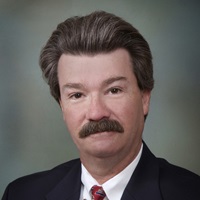
Edward Joseph Face, Jr. (Joe): Face has served as the commissioner of financial institutions for the Virginia State Corporation Commission’s Bureau of Financial Institutions (Bureau) since 1997. The Bureau regulates and supervises over 35,000 financial institutions, licensees and registrants controlling some $125 billion in assets. Face has been with the Bureau since 1979, when he began work as an examiner. He became deputy commissioner of financial institutions in 1993. From 2006-2007, Face served as the Chair for the Conference of State Bank Supervisors (CSBS). He has also represented state regulators in numerous groups, committees and coalitions, including the Federal Financial Institution Examination Council (FFIEC), the Federal Reserve Board’s Cross-Sector Umbrella Regulatory Working Group, the Financial Crimes Enforcement Network’s (FinCEN) Bank Secrecy Act Advisory Group, and the “Operation Jump$tart Coalition” financial literacy effort. Face received his Bachelor of Science in commerce and business administration from the University of Alabama, Tuscaloosa, Alabama and his Master of Science in administration from Central Michigan University, Mount Pleasant, Michigan.
 Brenda Foster is the chairman, president and CEO of First Western Bank & Trust, headquartered in Minot, North Dakota with branches and offices in Minot, Bismarck and West Fargo, North Dakota; Sioux Falls, South Dakota, and Alexandria, Minnesota, the Baxter/Brainerd Lakes area of Minnesota and Eden Prairie, Minnesota. She has been employed with First Western Bank & Trust for 42 years. Foster is a graduate of Minot State University (MSU) with an associate degree in legal secretarial studies and a Bachelor of Science in accounting with a concentration in banking and finance. Foster currently serves as a board member of the Federal Reserve Bank of Minneapolis, as well as a member of the North Dakota State Banking Board and the
Brenda Foster is the chairman, president and CEO of First Western Bank & Trust, headquartered in Minot, North Dakota with branches and offices in Minot, Bismarck and West Fargo, North Dakota; Sioux Falls, South Dakota, and Alexandria, Minnesota, the Baxter/Brainerd Lakes area of Minnesota and Eden Prairie, Minnesota. She has been employed with First Western Bank & Trust for 42 years. Foster is a graduate of Minot State University (MSU) with an associate degree in legal secretarial studies and a Bachelor of Science in accounting with a concentration in banking and finance. Foster currently serves as a board member of the Federal Reserve Bank of Minneapolis, as well as a member of the North Dakota State Banking Board and theMSU Board of Regents. She also serves as an advisory board member for the Bank of North Dakota and is a current member of the federal delegate board, as well as a director-at-large, for the Independent Community Banks of America. Foster is a past president of the Independent Community Banks of North Dakota’s board of directors and was instrumental in starting the Junior Achievement program in Minot.
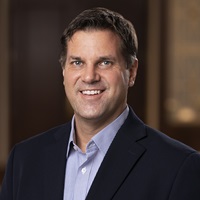
Jim Fuchs is a vice president at the Federal Reserve Bank of St. Louis, overseeing the operations of the bank’s Applications, Credit, Reserves, Statistics, Business Line Training Services, Quality Assurance, Digital Transformation Consulting, Supervision Policy Research and Analysis, and Supervision Outreach units. Fuchs also oversees a wide range of national outreach programs developed by the St. Louis Fed for community bankers and is a member of several Federal Reserve System workgroups focused on community banking issues. Fuchs also chairs the organizing committee the Federal Reserve/ Conference of State Bank Supervisors’/FDIC annual Community Banking Research Conference. Before joining the St. Louis Fed, Fuchs served as a banking policy adviser and directed financial communications for New York State Comptroller Thomas DiNapoli. Earlier, he was chief of staff to former New York State Banking Superintendent Diana Taylor and served as an advisor to New York City Mayor Michael Bloomberg. He is a former captain in the United States Air Force serving during Operations Desert Storm, Enduring Freedom, and Iraqi Freedom. Fuchs received his MBA from the University of Missouri-St. Louis and his Bachelor of Science from the U.S. Air Force Academy. He also earned a graduate certificate in communications from the University of Oklahoma and a teaching certificate in secondary mathematics from City College in New York. In addition, Fuchs is a graduate of the Department of Defense Information School and the American Academy of Dramatic Arts. He is also a graduate of the Stonier Graduate School of Banking at the University of Pennsylvania’s Wharton School of Business.
 Justin Gallagher is an assistant professor at Montana State University in the Department of Agricultural Economics and Economics. He was previously an assistant professor at Case Western Reserve University. Gallagher earned his Ph.D. in economics from the University of California, Berkeley and a MA in public policy from the University of Chicago. Gallagher is an applied microeconomist whose work is grounded in economic theory and motivated by the public policy relevance of the questions he asks. His primary research field is environmental economics with broad interest in household finance, labor economics, and public economics.
Justin Gallagher is an assistant professor at Montana State University in the Department of Agricultural Economics and Economics. He was previously an assistant professor at Case Western Reserve University. Gallagher earned his Ph.D. in economics from the University of California, Berkeley and a MA in public policy from the University of Chicago. Gallagher is an applied microeconomist whose work is grounded in economic theory and motivated by the public policy relevance of the questions he asks. His primary research field is environmental economics with broad interest in household finance, labor economics, and public economics.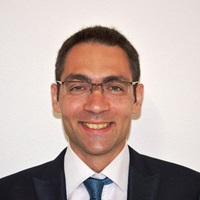
Michael Gelman is an assistant professor of finance at the University of Delaware’s Alfred Lerner College of Business and Economics. Previously he was a visiting scholar with the Department of Finance at the Wharton School of the University of Pennsylvania. He earned his Ph.D. in finance from Ben-Gurion University of the Negrev, Beersheba, Israel, with a merit award for excellence. He holds his Bachelor of Arts and his MBA in economics and finance from The Hebrew University of Jerusalem. Gelman’s primary areas of research are banking & financial intermediation, household finance and financial misconduct. His teaching experience includes a variety of courses on finance, financial risk management and economics for undergraduate and graduate students, as well as executives. He also has served as a consultant for several financial institutions.

Martin Gruenberg is the chairman of the FDIC Board of Directors. He has been a member of the FDIC Board since August 2005 and previously served as Vice Chairman from August 2005 to July 2011 and as Chairman from November 2012 to mid-2018. He has also served as Acting Chairman on a number of occasions. Prior to joining the FDIC, Gruenberg served as senior counsel to Sen. Paul S. Sarbanes (D.-Md.) on the staff of the Senate Committee on Banking, Housing, and Urban Affairs from 1993 to 2005. He also served as staff director of the Banking Committee's Subcommittee on International Finance and Monetary Policy from 1987 to 1992. In addition, he served as chairman of the Federal Financial Institutions Examination Council from April 2017 to June 2018. Beginning February 15, 2022, Gruenberg assumed the role of chairman of the Resolution Steering Group (ReSG) of the Financial Stability Board. Since June 2019, Gruenberg has served as chairman of the board of directors of the Neighborhood Reinvestment Corporation (NeighborWorks America), and he has been a board member since April 2018. He received his Juris Doctor from Case Western Reserve Law School and his Bachelor of Arts from Princeton University, Princeton School of Public and International Affairs.
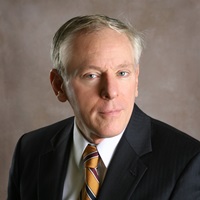
Charles R. Hageboeck (Skip) is the president and CEO of City Holding Company and its banking subsidiary, City National Bank, which currently has 99 branches in West Virginia, Kentucky, Virginia and Ohio. Hageboeck was formerly with Indiana National Bank, NBD Bank, N.A. and Peoples Bank of Indianapolis. He is a past chairman of the West Virginia Banker's Association and currently serves on the boards of the West Virginia Chamber of Commerce and the West Virginia Bankers Association. In 2018, Hageboeck was named "Community Banker of the Year" by American Banker. In 2023, City was named third out of the top 25 banks in the U.S. evaluated by Bank Director for its annual “RankingBanking” report. Hageboeck holds a Bachelor of Science in Economics from Butler University, Indianapolis, Indiana, and his Ph.D. in Economics from Indiana University, where his dissertation was in the area of bank failures.

Kiah Lau Haslett is the Banking & Fintech Editor of Bank Director. In addition to writing and editing web content and magazine features, she is the host of the FinXTech Reinventing Banking podcast and a monthly cohost of the Fintech Takes podcast. Her areas of focus include how technology is changing banking, balance sheet management, accounting, operations, strategy, and trends in mergers and acquisitions. She was previously a financial institutions reporter at S&P Global Market Intelligence, and has worked for Businessweek.com, The Arizona Republic, the Chicago Tribune and the Omaha World-Herald. Kiah has a bachelor’s in journalism from the University of Nebraska.

Ivan T. Ivanov is a senior economist in the Research Division of the Federal Reserve Bank of Chicago. Previously, he served as a principal economist with Systemic Financial Institutions and Markets section of the Research division with the Board of Governors of the Federal Reserve System. Ivanov’s research examines questions in financial intermediation, corporate finance, climate finance and public finance. His work centers on the financing of small-and medium-sized enterprises (SMEs) and the importance of banks for that process. His most recent research examines the effect of carbon pricing policy on the ability of SMEs and large companies to raise capital as well as the effectiveness of disclosure regulation in the municipal debt market. His research has been published in the Journal of Finance and the Journal of Financial Economics and has been cited in the Wall Street Journal, the Financial Times, Bloomberg, the Bond Buyer and the Harvard Law School Forum on Corporate Governance and Financial Regulation. Ivanov holds a Ph.D. in Finance from the University of Rochester, Rochester, New York and a Bachelor of Science in Mathematics and a Bachelor of Arts in Finance from Ramapo College of New Jersey.

Dr. Stephen Karolyi is a Senior Economic Advisor in the Supervision Risk and Analysis Department in the Office of the Comptroller of the Currency (OCC). In his current position, his primary responsibility is to manage research working groups of economists in support of agency-wide initiatives. Before joining the OCC in 2020, Dr. Karolyi earned his Ph.D. in Financial Economics from Yale University and taught undergraduate and graduate courses in finance, accounting, and applied econometric methods at Carnegie Mellon University. Dr. Karolyi’s current research interests are in financial intermediation and corporate finance.

Seil Kim is an associate professor of accounting at Baruch College, City University of New York. His main research interests are in the areas of accounting for financial institutions and corporate governance. He received a Ph.D. in Accounting from NYU Stern in 2016. He received his bachelor’s and master’s degrees in business administration from Seoul National University.

Oskar Kowalewski is professor of finance at the IESEG School of Management (Campus Paris), member of LEM-CNRS 9221 and researcher at the Institute of Economics, Polish Academy of Science. He was previously associate professor at the Warsaw School of Economics (SGH), Kozminski University and Vistula University in Warsaw.
His main research interests are in the areas of banking, corporate finance, and corporate governance, and recently agroeconomics. His contributions to the field were recognized in 2014 when he received a prestigious award from the President of the National Bank of Poland for his habilitation, marking a historic milestone for the central bank. He has supervised numerous research grants financed by public and private agencies.
Oskar Kowalewski received his habilitation in Finance from the Warsaw School of Economics in 2014. He holds an PhD and MS degree from the Kozminski University in Warsaw and LLM degree from the Maria Curie-Skłodowska University in Lublin.
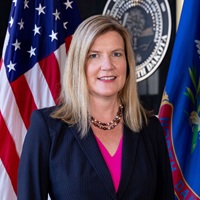
Lise Kruse is the current Chair of the Conference of State Bank Supervisors (CSBS) and the commissioner of the North Dakota Department of Financial Institutions. She was named commissioner in 2017. She joined the Department of Financial Institutions as a financial institutions examiner in 2004 and was promoted to chief examiner-banks in 2011. Prior to joining the DFI, she worked for a life insurance company in Fargo, ND. She received a Bachelor of Arts with majors in business and organizational communication from Concordia College, Moorhead, Minn. And her MBA with an emphasis in information technology from the University of Colorado, Colorado Springs, Colorado. Kruse is also a graduate of the Graduate School of Banking at Colorado, Boulder, Colorado. In 2020, Kruse was elected by her peers to serve on the CSBS executive board. She also serves on the Federal Deposit Insurance Corporation Regulatory Advisory Board.

Elena Loutskina is a professor of business administration and the Peter M. Grant II Bicentennial Foundation Chair in Business Administration at the Darden School of Business, University of Virginia, Charlottesville, Virginia (UVA). Her research is centered on financial intermediation. She originally started her work by exploring the impact of securitization on management of financial and nonfinancial companies. Over time, her research interest expanded to exploring more dimensions of commercial banks strategic management. Her papers have addressed topics in consumer finance, mortgage markets, small business lending and regulation of financial intermediaries. In 2019, Loutskina received the UVA Alumni Association Distinguished Professor Award. Her work has been published in the Journal of Finance, Review of Financial Studies and the Journal of Financial Economics. She is currently the co-editor of the Journal of Financial Intermediation. She has served as a visiting scholar with the Federal Reserve Bank of Cleveland and as fellow of the Wharton Financial Institutions Center at the University of Pennsylvania. Loutskina received her Ph.D. in finance from Boston College, Chestnut Hill, Massachusetts. She received her Bachelor of Science in mathematical economics and her Master of Science in applied math in economics from Belarus State University, Minsk, Belarus.
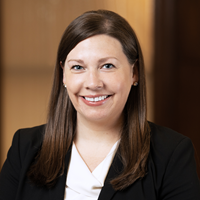
Kathleen Navin is a senior business economist at the Federal Reserve Bank of St. Louis in the division of Supervision. Navin’s responsibilities pertain to analyzing and presenting on economic and banking conditions in the United States and regionally. Prior to joining the Federal Reserve Bank of St. Louis, Navin held the position of Economics Executive Director in U.S. Economics at S&P Global Market Intelligence, joining the firm through the acquisition of Macroeconomic Advisers. In this role, she produced analysis on economic data and forecasts related to the US economic outlook and developed alternative macroeconomic scenarios for use in bank stress testing. She was previously a research associate at the Federal Reserve Bank of Kansas City in the division of Macroeconomics and Monetary Policy. Navin graduated with her Bachelor of Science in Economics and her Master of Arts in Economics from the University of Missouri, Columbia, Missouri. Navin is an active member of the National Association for Business Economics (NABE), currently serving a three-year term as a member of its board of directors. She became a member of NABE’s inaugural class of Certified Business Economists in 2015.
 Kathy O’Neill Paese is interim president and chief executive officer of the Federal Reserve Bank of St. Louis. Ms. O’Neill Paese has more than 35 years of experience with the Federal Reserve System, most at the St. Louis Fed. Ms. O’Neill Paese also currently serves as first vice president (FVP), chief operating officer and Federal Reserve System Treasury product director. In her role, Ms. O’Neill Paese is responsible for managing the Reserve Bank’s operations throughout the entire seven-state region of the Eighth Federal Reserve District. In addition, she chairs the St. Louis Fed’s Management Committee and is a member of the Discount Window Lending Committee.
Kathy O’Neill Paese is interim president and chief executive officer of the Federal Reserve Bank of St. Louis. Ms. O’Neill Paese has more than 35 years of experience with the Federal Reserve System, most at the St. Louis Fed. Ms. O’Neill Paese also currently serves as first vice president (FVP), chief operating officer and Federal Reserve System Treasury product director. In her role, Ms. O’Neill Paese is responsible for managing the Reserve Bank’s operations throughout the entire seven-state region of the Eighth Federal Reserve District. In addition, she chairs the St. Louis Fed’s Management Committee and is a member of the Discount Window Lending Committee.Prior to becoming FVP/COO, she was the executive vice president in charge of the Treasury Division, providing oversight and direction to the Treasury Relations and Support Office (TRSO) and 14 operational/technical services that the St. Louis Fed provides to the U.S. Treasury. As Fed System Treasury product director, Ms. O’Neill Paese and the TRSO have national responsibility for managing the relationship between the Federal Reserve System and the financial bureaus of the U.S. Department of the Treasury, and for coordinating and monitoring all of the Federal Reserve System’s Treasury support functions.
In addition to her local responsibilities, Ms. O’Neill Paese leads the Federal Reserve System’s Risk Management Committee, responsible for identifying and reporting on enterprise operational risk management activities, and serves on the Fed System Committee that oversees Research, Supervision and Community Development functions.
Prior to her roles in support of the Treasury, Ms. O’Neill Paese held a variety of positions in the Bank’s operations, Public Affairs and Business Development functions.
Ms. O’Neill Paese received her bachelor’s degree in communications from the University of Illinois, Urbana-Champaign, and is a graduate of the Kellogg School of Business’ Executive Leadership Program at Northwestern University. She remains active in the community by serving as an executive member of the St. Louis Anchor Action Network, and on the Chairman’s Executive Council of Greater St. Louis, Inc. Ms. O’Neill Paese also serves on the Board of Trustees for Webster University.
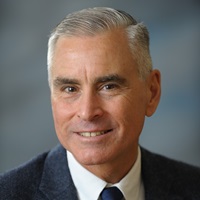
George G. Pennacchi has been with the Department of Finance at the University of Illinois since 1990, recently as the Bailey Professor of Money, Banking and Finance. He is currently a managing editor of the Journal of Financial and Quantitative Analysis and is an affiliate professor of finance at the University of Washington in Seattle. His research focuses on financial intermediaries, fixed-income securities and government guarantees. He has served as the president of the Financial Intermediation Research Society, the managing editor of the Journal of Financial Intermediation, and an associate editor of several journals including the Journal of Finance and the Review of Financial Studies. His consulting experience includes work for the Federal Reserve System, the Federal Deposit Insurance Corp., the U.S. Office of Management and Budget, the Bank of Finland and the Financial Stability Board. He has been a visiting professor at Bocconi University in Milan, Italy and was a member of the finance faculty at the Wharton School of the University of Pennsylvania. Pennacchi received a Bachelor of Science degree in applied mathematics from Brown University, Providence, Rhode Island, and his Ph.D. in economics from the Massachusetts Institute of Technology, Cambridge, Massachusetts.
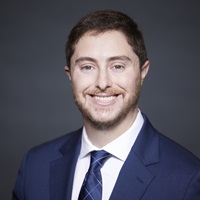
Joey Samowitz is senior director of policy development with the Conference of State Bank Supervisors (CSBS). At CSBS, he leads a team of analysts in crafting policy positions and managing workflows to inform action by state regulators. He provides thought leadership in several interagency groups and formerly represented the states on the FSOC digital asset working group. He is also the staff lead on the CSBS Bankers Advisory Board and provides key research on complex topics like digital assets, and regulatory proposals. He received his bachelor’s degree from the University of Maryland and is a graduate of the Graduate School of Banking at Colorado. Joey is currently studying for his MBA at the University of Nebraska-Lincoln. Joey joined CSBS in 2017.

Jeff Schmid is the president and chief executive officer of the Federal Reserve Bank of Kansas City.
In his role, Schmid leads a workforce of close to 2,000 employees in Kansas City and its branch offices in Omaha, Denver and Oklahoma City.
The Kansas City Fed is responsible for conducting monetary policy, providing financial services to depository institutions and the U.S. Treasury; and supervising nearly 1,000 banking organizations across its seven-state region, which includes western Missouri, Kansas, Nebraska, Oklahoma, Colorado, Wyoming and northern New Mexico.
Schmid represents the Tenth District on the Federal Open Market Committee, which sets monetary policy for the United States. He participates in each FOMC meeting and will be a voting member in 2025.
Before joining the Kansas City Fed in August 2023, he served as president and CEO of the Southwestern Graduate School of Banking at Southern Methodist University. He has several decades of experience leading banks and began his career as an examiner for the Federal Deposit Insurance Corp.
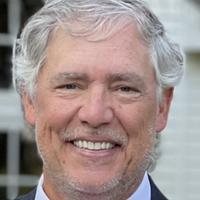
Thomas Siems is the chief economist with the Conference of State Bank Supervisors (CSBS). He joined CSBS in 2019 after serving 34 years at the Federal Reserve Bank of Dallas and more than 20-year teaching at Southern Methodist University in Dallas. Siems earned a Bachelor of Science in industrial and operations engineering from the University of Michigan and his Master of Science and Ph.D. degrees in operations research from Southern Methodist University. Siems is also a graduate of the Graduate School of Banking at Colorado and has published more than 75 articles in academic, Federal Reserve and referred journals. He delivered a 2015 TEDxSMU Talk, “The Wealth of Innovations,” and has authored five children’s picture books, including “The Dangerous Pet,” which poetically helps readers understand the dangers of debt.

Brian Sullivan is a senior media relations officer with the Federal Deposit Insurance Corp. (FDIC) and host of the FDIC Podcast. For more than 20 years, he has served in the public sector as a spokesperson and public affairs specialist for the FDIC, the U.S. Department of Housing and Urban Development (HUD), and the Federal Housing Administration (FHA). Prior to his government experience, Sullivan spent the first 20 years of his professional career in broadcasting, which included reporting, editing and producing local and national news at Milwaukee Public Radio, the former Mutual Broadcasting System, Westwood One, NBC Radio and WJLA-TV in Washington, D.C. He received his Bachelor of Arts in journalism from the University of Wisconsin-Madison. Growing up in the D.C. area, Sullivan will tell you he got his real start in the media early on when he delivered newspapers for the Washington Post and Evening Star.

Jeff Szyperski is chairman, president and CEO of Chesapeake Financial Shares, Inc. and Chesapeake Bank, a $1.331 billion institution based in Kilmarnock, Virginia. He is also chairman of Chesapeake Wealth Management. Sullivan is a past chairman of the American Bankers Association (ABA), as well as a past ABA executive committee member, board of directors member, nominating committee chairman, auditing committee chairman, and past chairman and member of the ABA’s Membership Council. He is also a past chairman of the Virginia Bankers Association (VBA), as well as a past VBA executive committee member, VBA board of directors member, and immediate past chairman of the VBA Education Foundation. He is a current member of the Federal Reserve Community Depository Institutions Advisory Council. Szyperski is a former senior manager with KPMG Peat Marwick in Raleigh, North Carolina, and is a former chairman and member of the Lancaster County Economic Development Authority. He is a graduate of the University of North Carolina at Chapel Hill; the Graduate School of Banking at Louisiana State University; and holds CPA (inactive) and CFP® (inactive) designations. Szyperski is a current member of the GO Virginia Region 6 council and executive committee and the Bon Secours Rappahannock General Hospital campaign committee.
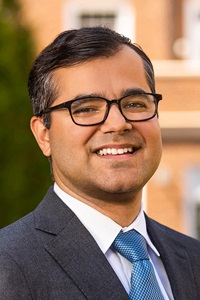
Siddharth Vij is an assistant professor of finance in the Terry College of Business at the University of Georgia. His research interests are in financial intermediation and regulation. Topics of recent projects include failed bank acquisitions, zombie lending, and the revolving door between government and industry. Vij currently teaches corporate finance to undergraduate students. He has a Ph.D. in Finance from the New York University Stern School of Business. He received an MBA from the Indian Institute of Management Bangalore and a bachelor’s degree in Electrical Engineering from the National Institute of Technology Karnataka.
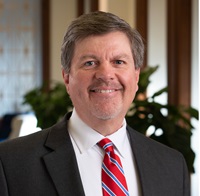
Carl White is the senior vice president of the Supervision, Credit, Community Development and Learning Innovation division at the Federal Reserve Bank of St. Louis. White has more than 35 years of experience in the Supervision Division of the Federal Reserve Bank of St. Louis. He is currently senior vice president of the Supervision, Credit and Learning Innovation Division. He has served in various other roles within Safety and Soundness, beginning his career as an examiner. Mr. White has served as lead instructor and course developer on numerous Fed System training courses, including an international assignment in Brazil. In addition, he served as the central point of contact for the District’s largest state member bank before and during the financial crisis. He and his team were nominated for the District’s President’s Award for Innovation as a result of efforts to implement and enhance off-site loan review and examination processes. Mr. White holds a bachelor’s degree with a major in finance from St. Louis University.
 Alexander Wirth is a Ph.D. candidate in Finance at the Ross School of Business, University of Michigan. Their research interests include financial intermediation, household finance, corporate finance, and fintech. Prior to pursuing a Ph.D., they worked as a pricing actuary in health and disability insurance. They earned an undergraduate degree in Actuarial Science and Finance from the University of Nebraska-Lincoln.
Alexander Wirth is a Ph.D. candidate in Finance at the Ross School of Business, University of Michigan. Their research interests include financial intermediation, household finance, corporate finance, and fintech. Prior to pursuing a Ph.D., they worked as a pricing actuary in health and disability insurance. They earned an undergraduate degree in Actuarial Science and Finance from the University of Nebraska-Lincoln.
Video Gallery

